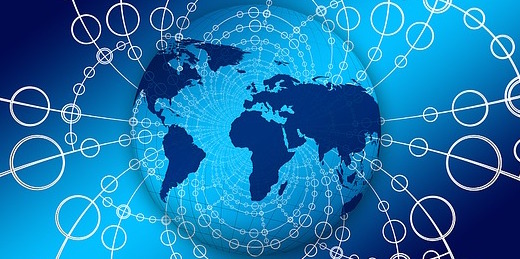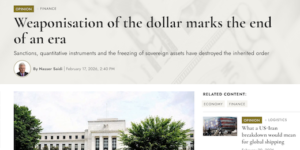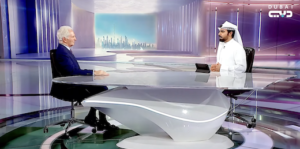The opinion piece titled “GCC can take centre stage in global energy transition” appeared in theArabian Gulf Business Insight (AGBI) on 26th July 2023.
An extended version of the article is posted below.
GCC will be at the Centre of a Transformed Global Energy Map
Nasser Saidi and Aathira Prasad
As nations navigate a post-Covid recovery path amid Russia-Ukraine war disruptions and sanctions, a New Global Energy map is emerging.
On the demand side, climate change and global warming -witness extreme temperatures- is forcing nations to accelerate their low-carbon energy transition plans, resulting in policy and consumer behavioural shifts away from fossil fuels. Global investment in low-carbon energy transition topped USD 1trn for the first time in 2022, up 31% year-on-year, and on par with fossil fuels investments[1]. The investments also spanned a vast spectrum: from renewable energy, the largest sector by investment (+17% yoy to USD 495bn) to hydrogen which received the least investment but was the fastest growing (USD 1.1bn, more than triple vs 2021). On the supply side, rapid technical change and innovation has resulted in a massive decline in the costs and thereby increasing the competitiveness of Renewable Energy, with the costs of solar, wind and battery declining by 90% over the past decade. Already, solar power is the cheapest form of electricity production.
Geopolitics is also driving a transformation of the global energy map. The Russia-Ukraine war along with US and the EU policies to decouple or “de-risk” from China are leading to energy supply chain disruptions and market fragmentation. Sanctions on Russia have heightened national energy security concerns, resulting in a restructuring of energy trade patterns: India and China accounted for almost 80% of Russian crude oil exports in May 2023, while nations shifting away from Russian Oil & Gas were looking towards alternative sources, including from the GCC.
Global energy consumption remains skewed towards fossil fuels, but with a rapidly rising share of renewables. The new economic and geopolitical energy market realities are accelerating the quest for long-term competitive, sustainable, clean, and secure energy. While dependence on oil and gas will persist into 2050, the GCC has a comparative advantage to reap the benefits of the paradigm shift to renewable energy.
Faced with the challenges of the global energy transition, the GCC are committing to massively increase the share of renewables in their energy supplies, the KSA to 50% by 2030 and Net Zero by 2060, the UAE to 30% by 2031 and Net Zero by 2050. The GCC is leading the Middle East’s massive investments in renewable energy which recorded its largest-ever increase in renewable energy capacity in 2022, commissioning 3.2 gigawatts of new capacity (+12.8% yoy)[2]. The UAE’s planned investments to the tune of US$165bn in clean and renewable energy initiatives over the next 30 years as part of its NZE goal underscores its commitment to furthering its clean energy agenda.
With these renewable energy investments and use of modern technologies, the GCC are achieving the lowest global cost of solar power. Masdar submitted (June 2023) the lowest bid for the 1,800MW Phase 6 of the Mohammed bin Rashid Al Maktoum Solar Park in Dubai: USD1.62154 cents per kilowatt hour (kWh) for the solar PV power project. Similarly, Hydrogen which could potentially reduce global emissions by 20% by 2050, at a price between $0.70 – $1.60 per kg- a price competitive with natural gas, has led to new alliances forming to develop megawatt projects, with some 31 projects in the region, including the world’s largest in NEOM Green Hydrogen Project and the DEWA & Siemens’ Green Hydrogen project using solar power.
The GCC, given its location at the heart of the global sunbelt, will become the lowest cost producer of solar power. Solar based, Green electric power can be exported from the GCC and North Africa to the rest of the Middle East, into Europe, East Africa, India, and Pakistan, through integrated power grids. This requires the development of an integrated electricity market allowing trading in energy.
The GCC’s experience with developing and using climate tech -including desalination, district cooling and desert agriculture- can result in these being export technologies. Take the example of desalination, where the GCC has 45% of global desalination capacity, with Saudi Arabia’s Saline Water Conversion Corp being the world’s largest producer of desalinated water. Renewable energy powered desalination plants can be used as a solution to global water supply problems, where the UN estimates that about 1 in 10 persons lack access to clean water and 1 in 4 do not have access to safe drinking water. Similarly, district cooling is 5-10 times more energy efficient than conventional cooling, with the GCC being a pioneer in the development and deployment of district cooling, addressing the fastest growing source of demand for power from accelerating global urbanisation.
Being at the centre of the global energy map, with 30.5% of global oil reserves and 29.5% of exports (20.7% and 25.2% respectively for gas), the GCC have a long experience with energy finance. The GCC can become hubs for climate and renewable energy finance. The region’s financial centres -DIFC, ADGM, KAFD, QFC- have the resources and expertise to become the regional/ global centres for climate, green & blue finance, accelerate issuance of green & blue bonds and Sukuk, attract VC investment into climate tech in the region and support listings of clean energy firms. Already, the GCC are using their massive financial firepower to serve their climate agendas. GCC sovereign wealth funds are among the largest investors in renewable energy – Mubadala last year invested USD 20.2bn (about 27% of total investment globally) via its subsidiary Masdar (which has a mandate to double renewable capacity in 2-3 years) while ADIA and QIA invested USD 2.2bn and USD 1bn respectively. Clean energy finance is not only integral to fuel climate change policies, but also has the added advantage of generating jobs and attracting FDI into the renewable energy and climate tech sectors, thereby accelerating the region’s energy transition and economic diversification plans.
The four building blocks of massive investment in renewable energy, comparative advantage in producing and exporting hydrogen and solar power through integrated grids, experience in using climate tech, supported by vast financial resources being used for climate & renewable energy finance, result in the GCC being able to provide highly diversified energy supply ranging from solar power to hydrogen complementing its oil and gas to climate tech. The GCC will be at the centre of the emerging New Global Energy Map.
[1] https://about.bnef.com/energy-transition-investment/
[2] IRENA.








